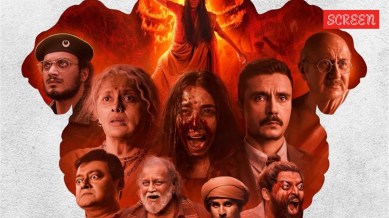Click here to follow Screen Digital on YouTube and stay updated with the latest from the world of cinema.

The Bengal Files movie review: First things first. For those who go looking for a detailed sketch of Gopal Patha, the so-called ‘Butcher of Bengal’, will be disappointed. The reason for this is evident. For the past several weeks, all we’ve been hearing in the context of Vivek Ranjan Agnihotri’s The Bengal Files is how it thrown a light on a forgotten chapter of our recent history in which Gopal Chandra Mukherjee, a local strongman, saved Calcutta from being ‘annexed by Pakistan’ on Direct Action Day on August 16, 1946.
The first part of the statement is accurate. Yes, there are several slices of pre-Partition, pre-Independence events recreated in the three-and-a half-hour film, in which we see Gandhi arrayed on one side and Jinnah on the other, with the latter’s demand of a Muslim Pakistan being put into motion by the reluctantly-departing British.
What came to be known as the Great Calcutta Killings took place over three days when the police force were ordered to look away and Muslim mobs, overseen by Muslim League’s Bengal supremo Suhrawardy, ran amok in Calcutta, targeting Hindus. According to several historical sources, if it hadn’t been for Patha’s active intervention, Calcutta would have fallen. But Patha’s not central to the film. He wades in, mobilises his troops, yelling, ‘if they kill one, you kill ten’. And having played his part, vanishes comprehensively from the film.
And then it dawns upon you that Patha, who also saved many Muslim lives during the riots according to his descendants, claiming that his (Patha’s) effort was to keep his beloved city intact, is a bit-player in cementing the thrust of the film, which swings from the present day to those turbulent days of the 40s.
And that thrust plays out in several strands throughout the film. The Partition ‘didn’t end’ in 1947. Religion is still being weaponised. ‘We, The People of India’ (this phrase keeps being used over and over again) are suffering. Some of these statements, you might argue, have a kernel of truth. We also hear characters giving speeches about the greatness of Bengal; how it is not just a ‘zameen ka tukda’, and how it is such a rich part of the country: what Bengal thinks first, India thinks after, thunders Bharati Banerjee (Simrat Kaur), who witnessed first-hand the horrors of the killings, and who now, in the present day, as an old woman (Pallavi Joshi), finds herself implicated in the disappearance of a young woman in Murshidabad.
Huh? What have the two things got to do with each other? Good question. Because that’s where the film comes unstuck, in its loose, confused stretched-out execution. In the present day, an IPS officer (Darshan Kumar) is dispatched to unravel the mystery of the missing girl, and becomes the conduit through which Ma Bharati recalls the horrific killings and rapes of those days in August, when Noakhali was burning, with Bapu (Anupam Kher) being shown as helpless against the fires that raged, leaving thousands dead. That Bapu was ‘weak’ and ‘wrong’ is also something that the film wants us to take away, a sentiment underlined in most of the recent propaganda films.
The performances are mostly over-wrought, reflecting the spirit of the writing. Mithun Chakraborty, as a drunken former cop, stands in for what happens to those who stand up. The forces in present-day Bengal are shown as kow-towing to the powerful local Muslim MLA, with only a handful of people like the near-amnesiac Ma Bharati and upright officer Shiva Pandit carrying the torch ‘for the people’, the latter also carrying the trauma of the displacement of the Kashmiri Pandits: the reference, straight up, is to the director’s previous ‘The Kashmir Files’.
The violence on display is sickening, with mutilated women being hung up on hooks in slaughter-houses, and men being torn apart in two. The actual butcher of Bengal who does his job really well is Ghulam Sarwar Husseini (Namashi Chakraborty); his present-day avatar is the canny politician Sardar Husseini (Saswata Chatterjee): the former used violence to cow the Hindu population of the 1940s ; the latter is involved in ‘deporting illegals from across the border, giving them identity cards, changing the demographic, and creating vote-banks’ – this is a statement we hear more than once.
Watch The Bengal Files movie trailer here:
Boom. Through all the exhausting meandering through time zones, in which the director slips in characters talking about the importance of we, the people, this is where everything comes to a pointed standstill. It is no one’s case that turbulent history shouldn’t be examined and interrogated cinematically: art is nothing if it doesn’t provoke or challenge, but it is not art if it incites or inflames. It all comes down to the choices the film makes, in spot-lighting certain events and blanking others: if Patha did indeed save Muslim lives too, then that should have been part of the script. It also comes down to intentionality and timing. The Bengal elections are around the corner; and so are, according to this film, ‘vote-banks’ and ‘changed demographics’ which short-hands to ‘ghuspaithiyas’, a phrase much in currency these days.
‘Why are we still doing Hindu-Muslim’, characters in the film are made to ask at several points. Well, there’s your answer.
The Bengal Files movie cast: Mithun Chakraborty, Pallavi Joshi, Darshan Kumar, Namashi Chakraborty, Anupam Kher, Simrat Kaur, Saswata Chatterjee, Priyanshu Chatterjee, Dibyendu Bhattacharya, Sourav Das, Mohan Kapur, Rajesh Khera, Puneet Issar, Palomi Ghosh
The Bengal Files movie director: Vivek Ranjan Agnihotri
The Bengal Files movie rating: 1.5 stars
Click here to follow Screen Digital on YouTube and stay updated with the latest from the world of cinema.